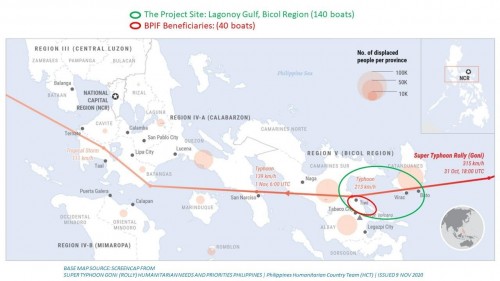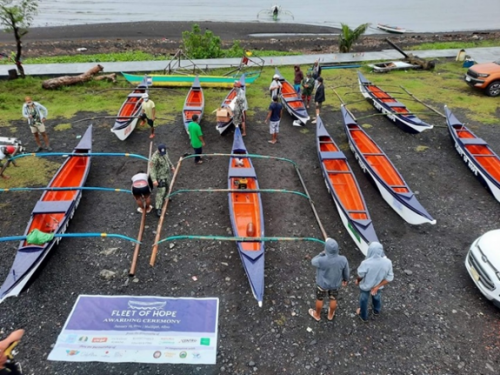【A-PAD Philippines】 Report on Fleet of Hope Project
2021.07.21
- Introduction
Super Typhoon Goni (Rolly PH), the world’s strongest typhoon in 2020, made four landfalls – first in Bato, Catanduanes at 4:50 AM on November 1, 2020 with maximum sustained winds of 225 km/h center and gusts of up to 280 km/h. It left a trail of destruction and devastated the fishing and farming communities as it crossed the Bicol Peninsula at a speed of 25 km/h. More than half a million families – or more than two million people – were affected across eight Philippine regions.
To help restore livelihoods and promote the early recovery of the most affected communities in Bicol, particularly Lagonoy Gulf, A-PAD PH and Que Rica teamed up for a project named “Fleet of Hope.” The objective of Fleet of Hope was to collect donations to build new motorized fishing boats and distribute them to fishermen who had lost their boats – their only source of incomes.
Lagonoy Gulf was chosen as the project site due to the extensive damage in the coastal communities along the Gulf. Winds of more than 200 km/h induced storm surges that destroyed houses, boats and fishing gear, and displaced families and washed out communities. It is also one of the most important fishing grounds in Bicol, known to be rich in commercially important fish species like tuna. Thousands of families derive their incomes from fishing activities in the Gulf.
- Fleet of Hope
Fleet of Hope received much support from the local business community, individual donors and partner organizations. Beginning with a target of 100 boats at launch in December 2020, by the end of the project in May 2021, a total of 140 boats had already been distributed. Together with partners, A-PAD PH and Que Rica have organized a total of 10 boat awarding ceremonies and awarded 140 boats to 140 fisherfolks in 11 municipalities and one city along the Gulf of Lagonoy, covering the provinces of Albay, Camarines Sur and Catanduanes.
The single largest partner in this undertaking is BPI Foundation with a donation of 40 boats. The 40 fishing boats were awarded to fisherfolks in Albay Province: Tabaco City (25), Municipality of Tiwi (10), and the Municipality of Bacacay (5).
At the onset, the modality of BPI Foundation’s participation in the Fleet of Hope initiative was agreed upon by the partners. There will be no transfer of funds from BPI Foundation to Que Rica or A-PAD PH. Each organization will be responsible for the cost of its own operations and participation in the project. Upon endorsement by A-PAD PH, BPI Foundation will directly transact with the boat and visibility sticker suppliers for proper vetting and direct procurement.
All issues and concerns of the partnership arrangement were discussed – timeline, target beneficiaries, and awarding program, among others. Apart from the online meetings, regular and open communication among the partners continued through email and over the phone conversations for the duration of the project period.
A-PAD PH led the social preparation activities. Meetings with local government officials were held to introduce the project and partners, the beneficiary selection criteria and field validation process, as well as the turn over ceremony program flow. When the boat fabrication and delivery date were set, the boat turnover schedule was likewise determined.
All Fleet of Hope activities on the ground were organized by A-PAD PH with due consideration of public safety standards and compliance to coronavirus health protocols.
- Beneficiaries
Each of the 140 beneficiaries were carefully selected based on criteria set by the partners: 1) their livelihood was severely affected by the recent typhoons; 2) owned a totally or partially damaged banca; 3) compliant with all LGU fishing requirements; 4) single-headed family household; and/or 5) needy with little or no capacity to repair or own a boat.
On the ground, A-PAD PH worked closely with two organizations – Tindog Bikol and Gulf of Lagonoy Tuna Fisher’s Federation, Inc., (GLTFFI). Tindog Bikol is a volunteer group composed of employees of the World Wildlife Fund for Nature (WWF Philippines) sustainable tuna fishing program in Lagonoy Gulf. Meanwhile, GLTFFI is a federation of 14 tuna fisher associations, each representing a city/municipality along Lagonoy Gulf. Activities at the community level were all coordinated and supported by the City/Municipality Agriculture Office (MAO) and the Barangay officials.
A beneficiary selection team composed of A-PAD PH, GLTFFI, Tindog Bikol, and MAO conducted house visits and face-to-face interviews as part of the selection and validation process. A standard questionnaire was used to record important information and family profiles of each beneficiary.
Focus group discussions with beneficiaries, local government representatives and local partners were facilitated by A-PAD PH to achieve a common understanding about the Fleet of Hope project and establish a memorandum of understanding (MOU). Some important provisions of the MOU are: the boats cannot be sold, rented or transferred to another person; the beneficiary should be compliant with all government policies and regulations regarding fishing and boat registration; the beneficiary will participate in activities for the public good such as relief delivery missions, maritime search and rescue, and sustainable fishing advocacy.
Moreover, as survivors of Super Typhoon Goni themselves and past disasters, the beneficiaries were reminded to undertake preparedness measures to secure their families and safeguard their boats and fishing gear from disaster risks.
The MOU and the beneficiary profiles were reviewed and approved by BPI Foundation prior to the signing and awarding ceremonies.
- Fishing Boat Design
The boat design and specification are suitable for handline fishing at the Lagonoy Gulf. Except for the outriggers, the boat awarded to the beneficiaries comes with a 7.5 HP gasoline engine and complete accessories – propeller, axel, cross joint w/ stainless bolt propeller shaft and rudder beam. The 7-meter-long boat is made of fiberglass and reinforced with a wood frame for a stronger engine base and floor support. The height is 0.56 cm, 0.74-cm breadth, 0.5-inch hull thickness, ¼-inch walling thickness, and 1-foot ribs distance.
With proper care and maintenance, the fiberglass boats can last more than 10 years, making it a more viable and sustainable option than wooden boats. However, fiberglass material was not the first choice of the fisherfolks, and traditional wooden boats were preferred. Eventually, after more than a month of consultations with relevant stakeholders, A-PAD PH was able to finalize a boat design within reasonable cost and approved by the technical experts and beneficiaries.
- Conclusion
A participatory community-based approach to disaster management fostering collective decision-making, knowledge‐sharing, and belief in people’s capacity and resilience guided Fleet of Hope’s project management. This short-term project engagement among donors and partners highlights the positive result of a coordinated, multi-stakeholder strategy that mobilizes public, private and community actors to bring about timely and appropriate humanitarian response. Meaningful partnerships such as this will move us forward as we aspire to make our collective impact more effective and sustainable.









